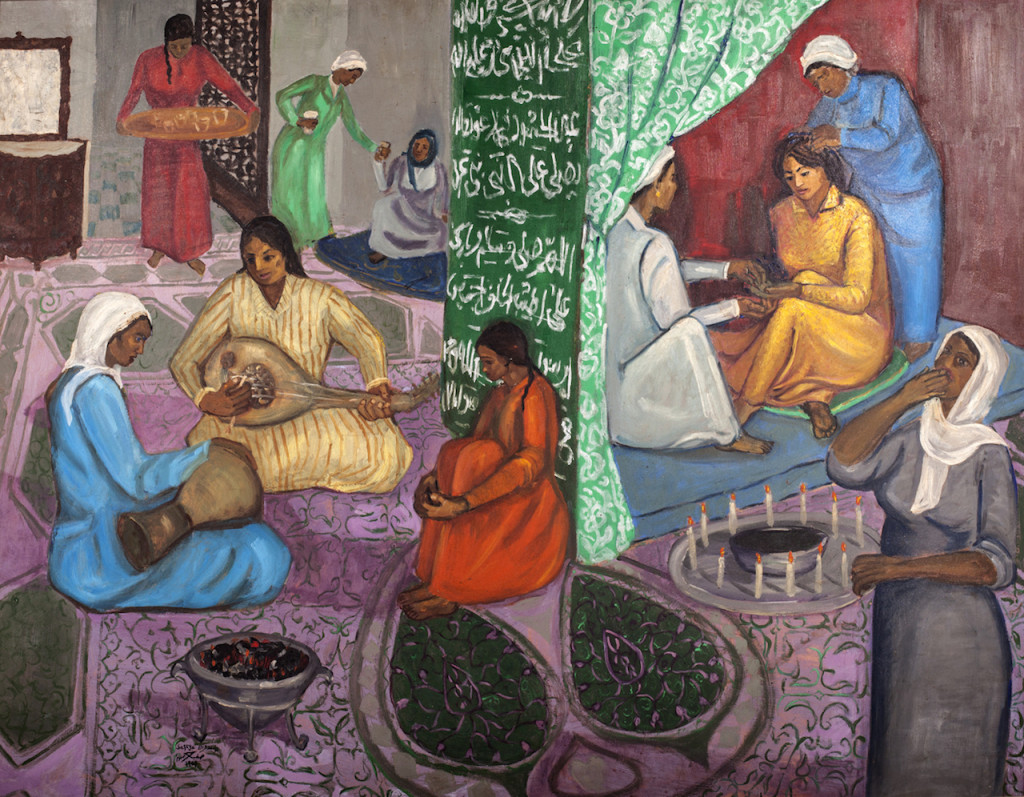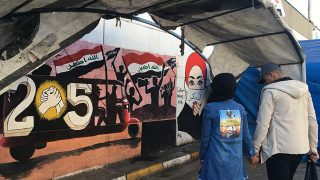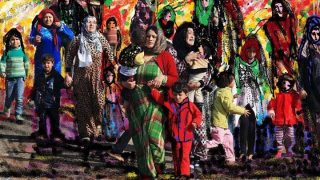While I was doing my fieldwork in Iraq within women’s groups and organizations for the purpose of my doctoral research on contemporary Iraqi women’s political activism, I heard about a woman hairdresser in Erbil who started an original initiative: opening a women’s only café. I asked several formally organized women’s rights activists about her, and sensed their discomfort; many seemed to dislike her. I easily got her salon’s address by people I met randomly in Erbil’s streets and decided to go and meet her. Khanem (خانم), 43, welcomed me very warmly and proposed we speak about her initiative over a cup of tea. A hairdresser from the age of 13, she was taught by her mother, who was also a hairdresser. Originally from Sulaymanyiah, Khanem and her family moved several times due to her father, a Kurdistan Democratic Party member, and his nationalist activism; they lived in Baghdad for more than five years. Khanem never received a secondary education due to this constant displacement. She spoke about the fact that her family did not allow her to marry a man she loved because a member of his family was Ba’thist. At the age of 20, Khanem was pressured to marry her neighbor’s son, who belonged to a prominent nationalist family. Despite the fact that she witnessed several of his infidelities during the time of their engagement, she was not allowed to call off the wedding and ended up married to him. Even with the three children they had together, she described her marriage to this man as the darkest period of her life.
The political situation in the region pushed Khanem and her family to move several times, including settling in Turkey and Iran for several years. Khanem spoke about the massive displacement of Kurds in 1991, when she fled to the Iranian borders. She gave birth to one of her daughters in between two cars with her mother’s help. Khanem recalled this experience as a deep physical and psychological trauma. As her husband refused to take any job not suited to his education, she financially carried her household, working two or three jobs at a time. The extent of her poverty, the instability of her life, the seemingly constant moving due to military clashes, the lack of support from her family, life with her in-laws and her resigning husband drove her mad. She cried while telling me that she had reached a stage of tiredness and pain that pushed her, at the age of 24, to attempt self-immolation. After this incident, Khanem was hospitalized for a week and obtained financial support from some family members.
Despite her non-religious background, Khanem turned to religion in her late twenties. Her family was angered by her religious practice, especially her husband:
In 1998, when we came back from Turkey, I wore a veil over my head. My husband went crazy. He took it off my head and screamed that he would divorce me three times if I chose to wear the headscarf. He would mock me when I was praying. My family, you know, they believe in God, but they do not like religious practice.
After obtaining a separation from her husband in 2010, Khanem started praying and wearing the hijab. Her turn towards religious practice materialized in her move towards a new life, especially after obtaining a divorce in 2011:
I decided to wear the hijab during Ramadhan. I was looking at myself in the mirror after reading the Qur’an with a hijab over my head, and I thought that with it, I am very beautiful, it makes me look and feel beautiful. The hijab gives me this pure and innocent face that I love. I fear God and I love the Qur’an. Now, I am financially independent, my kids have grown up, I can make my own choices independently from my husband, my family or any man. I wanted to wear the hijab for so long, but everyone forbade it. Now I finally can do it. I do not like religious parties, or any political parties, my Islam is different from all of them. I have nothing in common with them.
If Khanem’s turn toward religious practice reveals the Islamization of Kurdish society in the context of the 1990s rise of Islamist militancy, it also reveals how seeking to oppose her family’s secular political frame led her to dealing with her life and body in her own way.
After several meetings, Khanem and I got along very well and we decided to “do something” together for her initiative. At the time I visited her, the women’s only café was closed due to financial difficulties. She explained that her idea of a women’s only café stemmed from the fact that coffee and teahouses in Erbil, and most public spaces in general, are occupied by men. She wanted to create a “safe” space for women to gather, talk and meet outside their domestic spaces and away from male gazes. She planned to organize talks and discussions about women’s issues, especially about body, sexuality, marriage and divorce. Khanem also wanted to set up a support group for divorcee women, like herself, and open the café to young boys and girls for awareness raising discussion groups about sexuality and marriage.
Khanem believed that many perceived her initiative as “indecent”; several women’rights activists I spoke with described it as “wrong”. She complained about the fact that she did not get much support from women’s organizations in Erbil. In fact, when Khanem proposed her project to such organizations, what she did receive was a lot of criticism; “It is a project against men, why do you need a women’s only café?” was a typical response. After organizing a French Cultural Center screening of a short film about her women’s only café, I sensed many activists’animosity towards her. In a venue comprised mainly of women’s organizations and NGO representatives, Khanem addressed the audience after the film and criticized women’s NGOs for their activities; pointing out that such activities did not address ordinary women’s needs.
Kurdish women need to talk, to express their issues between each other, to talk about their bodies and to address inequalities and discriminations directly. The presence of party-backed women in the parliament and across NGOs does not serve women’s issues directly. You only talk about representation in the parties, you never talk about real issues. I want to have a space for us to talk about intimate issues, to help women to gain self-confidence, and nobody supported me. I want to talk about divorce, dysfunctional marriage and concrete issues, not only about being politically active for this or that group, organization or party.
Some prominent women’s organization representatives took the microphone and expressed their anger towards Khanem, saying that her project was “individualistic” and “business-oriented”, unlike NGOs who aimed to serve society as a whole. The debate shifted around women’s need to claim gender segregated spaces and the way in which they should formulate such demands.
As I organized this event with Khanem, I lost credit in the eyes of several women activists with whom I had built good relationships. At the same time, it forced me to realize the realities and limits of interactions between “ordinary women” – like Khanem, who refused to join any formal organization – and NGO women in Iraqi Kurdistan. I realized to what extent political correctness is the norm within many formally organized and NGO women’s rights organizations in Iraq, and that ordinary women would be heard and supported by women’s rights organizations if their demand followed the appropriate frame and vocabulary – e.g. “political representation” and “legal rights”. Women like Khanem who attempt to launch initiatives grounded in their own realities of life and with their own words and understanding of the “political” are often either not considered seriously or marginalized by middle-class NGOs professional women’s rights activists for not following their particular agenda.
English
Opposing NGOs, a Woman at Odds: the Women’s Only Café Initiative in Erbil
While I was doing my fieldwork in Iraq within women’s groups and organizations for the purpose of my doctoral research on contemporary Iraqi women’s political activism, I heard about a woman hairdresser in Erbil who started an original initiative: opening a women’s only café. I asked several formally organized women’s rights activists

From the same author
Women and the Iraqi Revolution
Zahra Ali 2020-03-09
The unprecedented process of popular unity since “October uprising”, show that Iraqi women and men are healing from decades of war and social fragmentation.
Women Rights in a fragmented Iraq
Zahra Ali 2015-03-29
Since Saddam Hussein’s regime was toppled by U.S. forces in 2003, Iraq has been wrecked by sectarian violence and unprecedented political bedlam. The roots of the stagnation of state...


